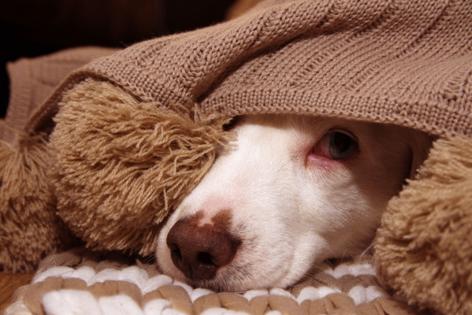Pet anxiety: Fireworks, thunder, separation (oh my!)
Published in Cats & Dogs News
On and around the Fourth of July, pets can experience an increase in anxiety due to loud noises from the holiday festivities. Veterinary clinics and emergency centers receive an influx of calls due to this increase in stress and even about pets who have ingested fireworks. However, with a little planning, you can try to help your pets tolerate this time of year, even if they may not understand or share your enthusiasm of this holiday as much as you do.
Here are some ways to help sooth your dog’s anxiety and keep them safe.
Create a haven for your dog. It is a good idea to create a place where your dog will feel more comfortable during times of overstimulation. Try setting up a crate in a quiet space away from windows, such as a basement or a larger closet, so that they can’t hear or see the fireworks. Their crate, if they feel comfortable and safe, is often a good choice to prevent them from causing danger to themselves or their environment. You can also throw a loose cloth or blanket over the crate to give the sensation of dark and calmness. Make sure to provide your pup with familiar toys and treats. Consider freezing bone broth into ice cubes to keep your dog occupied. Play white noise. You can try leaving a fan, television or radio on to help mask the sounds of the fireworks. There have been some reports that classical music can have a calming effect for dogs. Try the “Through a Dog’s Ear” music series that has been shown to work. An anxiety vest may work in some cases—if you don’t have one, try a snugly fitting T-shirt. Comfort your dog. If you can, try staying home with your dog or leaving them in the hands of a trusted person to verbally sooth your pup. Be careful about giving wrong verbal clues when interacting with your dog. Often, it’s not the word used but the tone that matters in how your dog understands and reacts to you. Sounding frantic in any way, even if you’re saying “It’s OK, it’s OK, it’s OK” in a higher-than-average pitch may make your dog think that there really is something to fear. You need to sound and stay calm to best reassure your dog. Walk and exercise them before the fireworks. Have your long walk or play session before dusk to increase the chances that you’ll tire your dog out as to avoid the sounds altogether. When you do go out, make sure your dog is secure on a leash before your walk. Keep your dog away from the fireworks. Don’t take your dogs to fireworks shows and don’t leave them outside alone in the yard during fireworks, especially if there are firecrackers being used in close proximity. It’s best to keep your dog inside during the commotion especially if you fear they might not react well and to keep them under control and feeling more safe and secure. Make sure your pet has proper identification. The Fourth of July is believed to have the highest number of dogs run away. Make sure that your pet has a form of identification. If your dog has an identification tag on their collar, make sure that information is accurate and current. Better yet, have your pet microchipped by your veterinarian. If they are already microchipped, make sure the information on is up to date and accurate. This way, if they escape, there’s a better chance they’ll get returned to you promptly and safely. Desensitize your dog to the sound of fireworks. If you suspect your dog will freak out at the sound of fireworks, try playing sounds of fireworks (very softly) so your dog is used to hearing them. “Counter-conditioning” combines pairing soft sounds of noises like fireworks or thunder with a treat that your dog likes. Start the volume low, so your dog can notice it but doesn’t show signs of stress like panting, pacing, leaving the area or trying to hide. Other tips including increasing the volume gradually, varying the source of the sound, and using different recordings. Talk to your vet about medications. If your pet’s anxiety is severe, consider making an appointment or phone call with your veterinarian well in advance of the holiday so you can discuss a medication that could help. This is the time to discuss questions on the available choices of over-the-counter CBD, dog-calming treats or dog anxiety vests. Your veterinarian may recommend different prescription anti-anxiety medications available.
If you do decide that anti-anxiety mediation is your pet’s best bet, there are a few things to remember to make sure you request the medication early enough from your veterinarian, at least a week or so before you need it. Remember to give them a practice dose of the medication before the big night to see how your pet responds to it. Lastly, never share the medication with another pet or give more than the recommended amount prescribed or sooner than listed on the directions. If you do so, you may end up spending the holiday at your local veterinary emergency clinic.
Consider hiring a trainer. If fear is negatively impacting your pup’s life, consider enlisting the expertise of a trainer. Many dogs (and their owners) need the expertise of a good trainer or board certified behavioralist to help desensitize your dog to fireworks or other fears gradually.
For more information on responsible dog ownership, visit the AKC at www.akc.org.
©2024 American Kennel Club. Visit at akc.org. Distributed by Tribune Content Agency, LLC







Comments